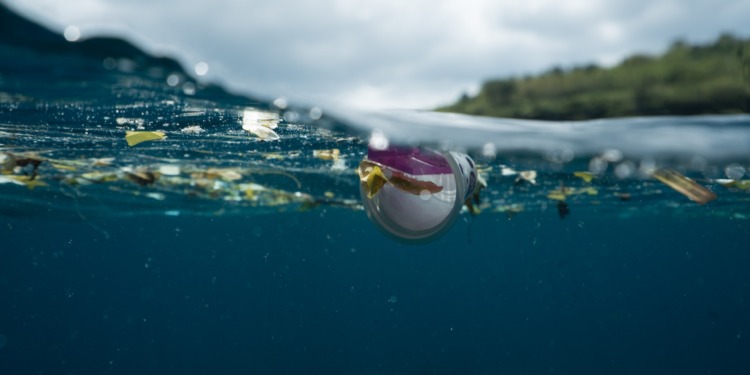A new study published in the open-access scientific journal, Plos One, has found a “plastic smog” plaguing our oceans. It’s made up of 171 trillion plastic particles and is thought to collectively weigh around 2.3 million tonnes.
The data was collected from nearly 12,000 sites in the Atlantic, Pacific and Indian oceans as well as the Mediterranean sea and was analysed by a team of international scientists between 1979 and 2019.
What they found was shocking. A “rapid and unprecedented” growth in plastic pollution since 2005 according to the study published earlier this month.
“It’s much higher than previous estimates,” Lisa Erdle, Director of Research and Innovation at the 5 Gyres Institute and one of the scientists behind the study, told CNN.
The production of plastic, single-use plastics in particular, has risen rapidly in the last decade. Coca-Cola was named the biggest producer of global plastic pollution last year. This single company pumps out 200,000 plastic bottles a minute, accumulating to three million tonnes a year.
This has left waste management technology unable to keep up. In fact, as little as 9% of global plastic is thought to be recycled each year.
This waste instead ends up in our oceans. The majority of the waste originates on land, and after being swept into rivers by rain, wind, overflowing storm drains and littering, it then flows out to sea.
Once at sea, plastic does not easily decompose; it breaks down into tiny microplastics which are very difficult to remove, wreaking unchecked damage on our marine life.
“Plasticosis,” for example, is a newly discovered fibrotic disease found in seabirds. The disease is thought to be caused by the birds ingesting ocean-bourne plastic that then causes excessive stomach scarring, damaging their digestive systems.
Plastic also seeps toxins into the water. It gets mistaken for food and also traps and entangles wildlife.
As well as a tragic environmental disaster, plastic is also a huge climate problem. Fossil fuels like oils and gases are the raw materials needed to make plastic, so a large increase in plastic production means a large increase in planet-heating pollutants.
Given the interconnected nature of environmental, animal and human wellbeing on this planet, a One Health approach must be adopted to tackle the damage that plastic pollution is exacting on marine environments, as well as the wildlife and human populations that depend on them.
(1/2) 🚨BREAKING: A #PlasticSmog, made up of more than 170 trillion particles, is afloat in the world’s ocean.
Read our research paper on @PLOSONE: https://t.co/E9PAhA9Iso pic.twitter.com/Pw9OtM2LiT
— 5 Gyres (@5gyres) March 8, 2023
What’s the solution to plastic pollution?
According to Erdle: “The ocean is a complex place. There are lots of ocean currents [and] there are changes over time due to weather and due to conditions on the ground.” This has made figuring out exactly how much plastic is in the ocean a hard task.
Researchers collected evidence from both published and unpublished peer-reviewed papers to build an extensive picture in terms of both timeframe and geography.
Most samples used in the study came from the North Atlantic and North Pacific oceans; this is where most of the data from previous studies exists. More data is still needed from the Mediterranean Sea, Indian Ocean, South Atlantic and South Pacific oceans.
Related Articles: Plasticosis: A Synthetic Health Crisis Waiting in the Wings? | High Seas Treaty Deep Dive: What’s the Plan to Protect the Ocean? | Landmark High Seas Treaty Agreed, Ushering in New Rules for Two-Thirds of the Ocean | Good Sign for Ocean Recovery: Whales May be Coming Back to the UK
Win Cowger, a research scientist at Moore Institute for Plastic Pollution Research in California and another of the scientists behind the study, said in a statement: “This research opened my eyes to how challenging plastic in the ocean is to measure and characterise and underscores the need for real solutions to the problem.”
According to the study, there have been multiple agreements since the 1970s that aim to tackle the flow of plastics into the ocean. However, most of these agreements are voluntary, fragmented and rarely include measurable targets.
Urgent international policy is required, notes the study. Any agreements must also be stricter and more uncompromising.
The UN’s landmark High Seas Treaty is certainly a step in the right direction. Its mandate is legally-binding, requiring all member countries to assume collective responsibility for overlooked marine environments and transboundary international waters.
The High Seas Treaty is BIG news for our ocean!
🌊 30% of the world's ocean will be protected
🐠 Increased funding for marine conservation
🪸 Better shared marine genetic resources
This is a milestone in the fight against #ClimateChange, #biodiversity loss & pollution! pic.twitter.com/9ksUwrO90S
— UNESCO 🏛️ #Education #Sciences #Culture 🇺🇳 (@UNESCO) March 9, 2023
The UN has promised to create a legally binding treaty on ocean plastic by 2024, addressing the entire life cycle of plastics from production to disposal. There are, however, large divisions over whether this treaty should include a limit on plastic production, currently expected to quadruple by 2050.
Policies to reduce the amount of plastic being produced seem to be the most logical way to cut the problem at the stem, especially when big companies continue to pump enormous amounts of waste into our oceans. As the scientists behind the study state: “Preventative strategies” and “urgent solutions” are required.
The plastic problems are already apparent and studies such as this one are vital in providing the data necessary to inform the strategies, solutions and policies to tackle them. But as well as further research, now is the time for action.
Editor’s Note: The opinions expressed here by the authors are their own, not those of Impakter.com — In the Featured Photo: Plastic waste floating in the ocean. Featured Photo Credit: 7inchs










